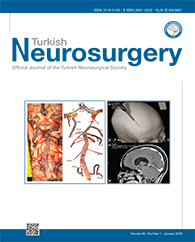2Ankara University, Faculty of Medicine, Department of Neurosurgery, Ankara, Turkey DOI : 10.5137/1019-5149.JTN.25028-18.3 AIM: To investigate predictive factors for a favorable outcome from subthalamic nucleus-deep brain stimulation (STN-DBS) in Parkinsonâs disease (PD) and whether low serum vitamin B12 (vB12) levels can predict an unfavorable outcome.
MATERIAL and METHODS: Thirty-nine patients with PD who underwent bilateral STN-DBS were retrospectively analyzed. A difference of at least 30% between preoperative medication-off and postoperative medication-off stimulation-on Unified PD Rating Scale (UPDRS)-III scores was accepted to be a good outcome. Patients with good and bad outcomes were compared in terms of age, gender, levodopa responsiveness, vB12 levels, UPDRS subscores, presence of diabetes mellitus and hypertension, and presence of lacunes on cranial magnetic resonance imaging (MRI).
RESULTS: Twenty-two of 39 patients (56.4%) had a good outcome postoperatively. No significant difference was observed in terms of age, gender, presence of abnormal MRI findings, and comorbid diseases between patients with good and bad outcomes. Mean preoperative bradykinesia score in patients with a good outcome was higher than those with a bad outcome. There was a positive correlation between the benefit of STN-DBS and preoperative levodopa responsiveness. In patients with low vB12 levels, 33.3% had a good outcome, whereas 55.2% of patients with normal vB12 levels had a good outcome (p = 0.589).
CONCLUSION: Our results confirm that patients with better levodopa response have better outcomes. Interestingly, patients with worse bradykinesia had a better surgical outcome. A favorable surgical outcome was less frequent in patients with low vB12 levels and was not statistically significant.
Keywords : Parkinsonâs disease, Subthalamic nucleus, Deep brain stimulation, Outcome, Predictive factors, Vitamin B12




